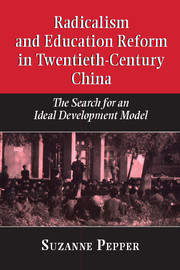Book contents
- Frontmatter
- Contents
- Acknowledgments
- 1 Educational development and the Chinese experience
- Part I The republican era: origins of radical education reform
- 2 Development dilemmas in the republican era: the League of Nations report
- 3 The inheritance
- 4 The modern school system
- 5 The critical backlash
- 6 Early communist alternatives: Jiangxi and Yan'an
- Part II Learning from the Soviet Union
- Part III Cultural revolution and radical education reform
- Appendix: the Hong Kong interviews
- Select bibliography
- Index
- Frontmatter
- Contents
- Acknowledgments
- 1 Educational development and the Chinese experience
- Part I The republican era: origins of radical education reform
- 2 Development dilemmas in the republican era: the League of Nations report
- 3 The inheritance
- 4 The modern school system
- 5 The critical backlash
- 6 Early communist alternatives: Jiangxi and Yan'an
- Part II Learning from the Soviet Union
- Part III Cultural revolution and radical education reform
- Appendix: the Hong Kong interviews
- Select bibliography
- Index
Summary
Acceptance of modern Western learning did not come in China until successive military defeats and encroachment by the Western powers forced change upon the self-confident Chinese empire. But change, when it finally came, was systemic in scope, reflecting the close relationship between traditional learning and the imperial bureaucratic state. The two collapsed almost simultaneously, suggesting that neither could have long survived the other. Yet under the old regime, the state's direct involvement with learning was limited primarily to administering the examinations used for selecting government officials. The content of the examinations was limited in turn to the classical Confucian canon. This ensured the latter's propagation, however, not only as the main repository of learning and values but more concretely as the sole course of study leading to the most prestigious occupation in the land.
Education and the Confucian tradition
The examinations are traced by convention to certain nonhereditary values idealized by Confucian tradition as requisites for filling government posts in antiquity. Historically, this Chinese device for bureaucratic selection has been interpreted as a function of medieval dynastic struggles for control over central and local government posts. The civil service examinations, which survived until 1905, date from the Sui dynasty (A.D. 581–618) and were used to enhance its power by invoking the Confucian tradition of merit to legitimize imperial hegemony over administrative appointments. During the subsequent Tang and Song dynasties (618–906 and 960–1279, respectively), the examinations accordingly played a pivotal role in the development of an imperial bureaucratic state.
- Type
- Chapter
- Information
- Radicalism and Education Reform in 20th-Century ChinaThe Search for an Ideal Development Model, pp. 46 - 58Publisher: Cambridge University PressPrint publication year: 1996



